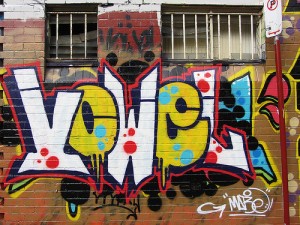
Flickr Creative Commons/Newtown grafitti
Earlier this week, we tackled the question of why some words get a double consonant in the plural form while others don’t.
We talked about Dutch words that have the short vowel sound like bot (bone) and man (man) that need that double consonant in the plural form (botten and mannen) to maintain their short vowel sound so they don’t get confused with words like boot and maan (boat and moon) which have a long vowel sound, therefore getting only one consonant in the plural (boten and manen).
Short vowels
bot -> bone
plural: botten -> bones
man -> man
plural: mannen -> men
Long vowels:
boot -> boat
plural: boten -> boats
maan -> moon
plural: manen -> moons
Then, woord (word) came in for the surprise attack. Unlike in the examples above, the plural of woord is woorden, not worden (which means “to become”).
So, just why does woord get to break the rule?
Well, actually, it’s not breaking any rule. Instead, it’s following a slightly modified version of the one we learned on Monday.
Remember the reason for adding the double consonant to short vowel words like bot and man in the plural?
If you said “to indicate that the vowel is to remain short,” or something to that effect, you’re right! We add the extra consonant to keep the sort vowel short. When it’s a long vowel, no extra consonant is needed.
Now let’s go back to our friend woord. Because it has the double “o,” we know that it gets the long “o” sound. If you look closely at the tail end of the word woord, there are already two consonants – “rd” Since it’s already got two consonants, we don’t have to add another one. Nor do we need to take a vowel away like we had to do with boot and maan. We’re off the hook! Just add an “en” to the end and you’ve got woorden (words). Woorden maintains its long “o” sound without us having to do anything special. And everyone lives happily ever after.
So, let’s recap:
woord -> word
plural: woorden -> words
*worden means “to become”
Here are a few more examples to set the record straight:
paard -> horse
plural: paarden -> horses
*parden is not a word
moord -> murder
plural: moorden -> murders
*morden doesn’t exist
And there you have it! Everything you need to know about double vowels and double consonants in the plural form.
If you have any questions or any words you would like to add to our lists, please leave a comment in the space below.





